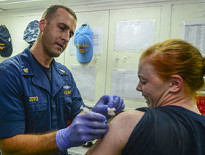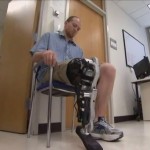
A sudden life-threatening illness is every family’s nightmare. A loved-one suddenly develops an overwhelming infection or is in a terrible accident. She is rushed to the intensive care unit (ICU) and is put on a ventilator (breathing machine). Many medications are started or she is rushed to surgery for her traumatic injuries. To the family, the first day or two is a blur of life-saving treatments, painfully waiting for the next update. The patient is on strong sedatives and non-communicative. She survives the worst days. The infection improves, or the surgeries fix the worst injuries. The ventilator is removed and the sedation is stopped. It looks like she’s going to make it. Families are usually unprepared for this next stage. In the movies the patient might spring out of bed and return home or a musical montage would convey her complete recovery over the next few days.
In reality the patient spends days in the ICU weak, confused and agitated. She doesn’t sleep. She recognizes loved ones only intermittently and has conversations with people who aren’t there. Other times she’s very lethargic and only answers questions with a word or two. Her family is terrified.
Doctors call this syndrome delirium, and it’s very common in critically ill patients. Delirium manifests in disorientation, agitation, and a level of alertness that can change quickly over time. Though delirium affects all mental process, the primary deficit is in attention. Delirious patients can’t focus on a task or on a question from one moment to the next.
The brain is usually an innocent bystander in delirium. Delirium is almost never caused by a primary brain problem – a stroke or a brain tumor, for example. Delirium is caused by a problem elsewhere that is disorganizing brain function – respiratory failure that is sending the brain too little oxygen or too much carbon dioxide, kidney or liver failure that is sending the brain too many waste products, or an infection that is sending the brain bacterial toxins.
In my training I was taught that once the cause of delirium is found and treated, the delirium might take days or weeks to improve, but that the improvement would be complete. I’ve discussed with many families preparing to take home a loved one that the patient’s periods of confusion would be shorter and the periods of lucidity would be longer, and over the next few weeks her mental status would return to normal. It turns out that’s not true.
A study published in this week’s New England Journal of Medicine (NEJM) sought to measure the long-term mental effects of critical illness. The study enrolled over 800 patients who were admitted to an ICU for respiratory failure, overwhelming infection, or cardiovascular failure (cardiogenic shock) for any medical or surgical reason. The vast majority of them had no cognitive deficits prior to this illness. Their average age was 61. This was an extremely sick group. They spent an average of 3 days on a ventilator and 10 days in the hospital. 74% had delirium, and on average delirium lasted for 4 days. The survivors were followed and underwent a broad battery of neurocognitive tests administered by psychologists 3 months and 12 months after their hospitalization. (For a sense of how desperately ill these patients were, 31% died between their ICU admission and the 3 month follow-up.)
The results were surprisingly poor. Three months after hospitalization 40% of patients had cognition scores that would be typical for a patient with a moderate traumatic brain injury. 26% were even worse and had scores similar to patients with mild Alzheimer’s disease. Twelve months after hospitalization those percentages were only slightly better, 34% and 24% respectively. More shocking was that the rate of prolonged cognitive impairment did not depend on age; young people did as poorly as old. The deficits did correlate, however, with the duration of delirium while they were hospitalized.
This study highlights several gaps in our current care of critically ill patients. Measures are already taken in ICUs to minimize the likelihood and duration of delirium. These measures must be redoubled with the knowledge that delirium may harm patients’ mental function even a year later. Ambulation as early as possible and re-establishing the sleep cycle with daytime alertness and stimulation and nighttime sleep (which requires darkness and quiet) have been two of the more promising methods to protect patients’ mental status.
As important as the ICU care may be the post-discharge follow up. Patients and families should be warned that deficits in thinking and memory may persist for a long time. Just as we prescribe physical therapy for a weak patient going home from the hospital, perhaps we should also be recommending cognitive testing and rehabilitation. And we should keep in mind that patients and their families may require more help than we’ve appreciated for longer than we thought.
Learn more:
Intensive-Care Units Pose Long-Term Brain Risk, Study Finds (WSJ)
Delirium In The ICU May Pose Ongoing Risk Of Thinking Problems (Shots, NPR health news)
Brain problems can linger months after ICU stay (Reuters)
Long-Term Cognitive Impairment after Critical Illness (NEJM article)
Disability after Critical Illness (NEJM editorial)

